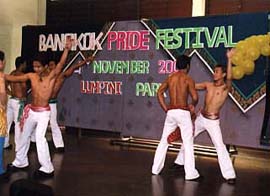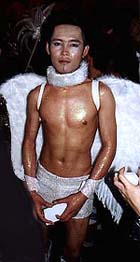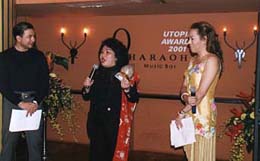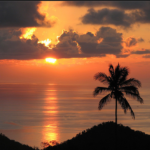Also see:
Gay Thailand Stories
Gay Thailand News & Reports 2000 to present
Gay Thailand Photo Galleries
| By Richard Ammon November 2001 (981 words) |
 |
Glitter and Change
Fringed by a huge storm cloud thundering in the high horizon, Bangkok’s third annual Gay Pride Parade nevertheless kicked off (dry) on time and in place November 4th. By 6 PM starting time, the unusually high temperature had receded from the sweltering mid-nineties earlier in the day.

Festooned, feathered and fluffed, hundreds of marchers climbed aboard a few decorated floats or walked along the main avenues of Silom and Suriwong, one of the ‘gay districts’ of intense modern Bangkok. Disco/pop music blared from huge speakers on the floats, festive balloons arched over the platforms and a rainbow of colored lights lit up the evening scene. Catcalls, cheers and shrieks of delight pierced the heavy evening air. By kick-off time, a couple of thousand spectators, many from western countries, had lined the two streets to shout approval for this year’s smaller but spirited spectacle; the enthusiasm more than compensated for the reduced size.
A noticeable change from the first parade I witnessed in 1999 was the lack of ‘flesh’—no floats or groups of go-go boys in tight shiny shorts or skin-tight bikinis gyrating in seductive motion. Instead, some wore T-shirts and tennis shorts while others went shirtless but wore long pants.

Yet sexuality and carnival hedonism were not absent from the parade, but they were in reserve as fanciful and ethnic costumes were more present. However, in typical informal ‘Thai style’ numerous individual marchers just showed up in their larkish costumes, some sporting bikini briefs and lots of feathers.
One of the key coordinator of the parade, Pakorn Pimton, said the parade, in the past, "had come under public criticism for outrageous drag costumes, scenes of men kissing each other in the street and partial". In order to get the necessary police permission and help for this year’s event, Pakorn sought to change the parade’s image by softening the sexuality and emphasizing different aspects of Thai culture and traditions. Marching along with the usual contingents of gay bars, discos and clubs were individuals and groups dressed in traditional Thai costumes from various parts of the country.
In playing down the sexuality, it seemed the organizers were also attempting to shift the style of the festival’s ‘gay look’ away from a western imitation (with its emphasis on exotic erotic) to a more indigenous and conservative Thai style. Indeed, the first contingent leading the parade was a  small troop of men dressed in as royal Thai ‘guards’, in bright red full-body costumes, bearing a guardian garuda and a portrait of the King and Queen of Thailand—a clear step back from the sensual to the sober.
small troop of men dressed in as royal Thai ‘guards’, in bright red full-body costumes, bearing a guardian garuda and a portrait of the King and Queen of Thailand—a clear step back from the sensual to the sober.
Following behind the royals were various lesbigay organizations such as the Anjaree women’s group, Utopia Tours, Rainbow Sky social group, Silom City gym, Dick’s Cafe and Amnesty International. Absent were the ‘hot guys’ from the numerous massage parlors in Bangkok. (Earlier this fall, there were ‘police actions’ at some parlors and saunas under the ruse of cracking down on underage workers or customers. Within a couple of months things seemed to have returned to normal, however.)
This is not to say there was no eye candy. Several go-go bars and gay discos had dancers and marchers in fantasy costumes such as bare-chested ‘angels’ with big feathered wings. Numerous individuals sported bright golden Thai head-dresses along with costumes that fanned out and up like butterfly wings. There were also some buffed-up gym boys clad in leather straps. Also using the occasion to flaunt their powder puff fantasies were many drag queens bedecked in shimmering satin gowns, glittering headpieces, sequins galore and over-the-top make-up.
Also using the occasion to flaunt their powder puff fantasies were many drag queens bedecked in shimmering satin gowns, glittering headpieces, sequins galore and over-the-top make-up.
Preceding the parade was a newly organized ‘Pink in the Park’ festival held in the large central Lumpini Park near Silom Road. A couple of dozen booths were set up by various organizations such as Anjaree, Amnesty International, Rainbow Sky, Bangkok Gay Festival, Durex condoms as well as several restaurants and food vendors. There was also a volley ball competition, a fashion show, a panel discussion about being gay in Thailand and a mini-parade in one corner of the park.
Beyond the Festival
Behind the cheerful and colorful scenes of the festival and parade, however, were more serious concerns and efforts. In the Sunday (Nov 4) edition ‘The Nation’ one of Bangkok’s two leading English language newspapers, a thoughtful article appeared which probed some long-term issues of being homosexual in Thailand.

The reporter wrote, " Pakorn Pimton, the key organiser of Bangkok Gay Festival, admits that gay liberation is still an uphill battle in Thailand. ‘There is discrimination [against gay people] everywhere. For example, those in civil services find it impossible to get promoted.’
"Because there is no legal support for same-sex unions, gay people find their basic rights violated even in matters of life and death. For example, if one partner is hit by a car, there’s no guarantee that the other will be allowed to see him or her in the ICU, as gay and lesbian partners are not recognised as ‘family’."
Others have more fundamental doubts about the value of parades. ‘They’re fun and colourful, but I don’t expect them to bring about much in terms of positive social change,’ said Chantalak Raksayu, co-ordinator of the lesbian group Anjaree. ‘While we are represented in the parade every year, we find the format too limited to get our messages across. Most of the time, it reinforces the public’s stereotypes.’
The news report went on to say that "well-integrated into the women’s rights and human rights movements, the Anjaree group is likely the strongest representative of gay and lesbian voices in Thai society today. Within their limitations, they have been trying from behind the scenes to push for changes in government policy."

’We have skipped so many steps that have to come before celebration …We take it [liberation] for granted because we didn’t have to fight for anything. This year will be about those missing links,’ says the Pride Coalition’s Michael Chawanasai, a Chicago-born Thai artist, referring to the situation in the West where the gay rights movement emerged as a reaction against police oppression and homophobic violence.
"Thailand’s gay groups arose in the 80’s as a result of the Aids epidemic. Even today, most of their activities still center around the disease and its prevention – both within and beyond the gay population.
"While the fight against Aids is a noble crusade that requires urgent and continuous attention, Thailand’s gay groups have largely ignored other issues that also need to be addressed: discrimination, gay teen suicides, child prostitution, etc."
Importantly, the reporter noted that there is no strong umbrella organization to co-ordinate among the various gay groups in Thailand that provide social support or medical advice for gay people.

" ‘Maybe the social temperature is now just right for that," says Natee Teerarojjanapongs, a well-known Aids activist now involved with the Pride Coalition. ‘There are many upstart gay groups, and the public have increasingly opened up to gay people… People no longer object to gay characters on TV.’ The Pride Coalition emphasizes that there’s a need to broaden the appeal. Although he once led a dance troupe to campaign against Aids for several years, Natee fears a backlash the Western gay rights movement suffered in the early 80s: ‘We don’t want people to link gays with AIDS.’
"So the celebration this year has begun to take on the more probing task of deepening its meaning and message. It has begun the complex task of formulating essential questions about its appearance, its definition of ‘gay in Thailand’ and its strategy in opening up this conservative culture to the deeper realties of people who happen to be gay by nature.
(For more pictures of the 2001 Bangkok Gay Festival, go to Photo Gallery.)
The 2001 Utopia Awards
Two days before the parade, Utopia Travel of Bangkok presented its second annual recognition awards to individual and organizations who have made important contributions to the Asian lesbigay community.
The first award went to the Thai writer and stage performer Wannasak Sirilar (who could not attend the ceremony) who has brought to his performances important gay themes and broadened public awareness of important human rights issues.
 The second awardee was the Malaysian Pink Triangle Foundation, an NGO focused on HIV and sexuality issues for almost 15 years. It offers education and prevention programs for the public and support programs for HIV people. Said Utopia, " The environment for gays and lesbians in Malaysia is still not a welcoming one, and the Pink Triangle Foundation has been truly heroic in its determination and single-mindedness in difficult circumstances." The award was accepted by one of the Foundation’s board members, Khartini Slamah, a dedicated transgender woman who has been involved in advocacy for lesbigays as well as disenfranchised Malaysian sex workers for over twenty years.
The second awardee was the Malaysian Pink Triangle Foundation, an NGO focused on HIV and sexuality issues for almost 15 years. It offers education and prevention programs for the public and support programs for HIV people. Said Utopia, " The environment for gays and lesbians in Malaysia is still not a welcoming one, and the Pink Triangle Foundation has been truly heroic in its determination and single-mindedness in difficult circumstances." The award was accepted by one of the Foundation’s board members, Khartini Slamah, a dedicated transgender woman who has been involved in advocacy for lesbigays as well as disenfranchised Malaysian sex workers for over twenty years.

The recipient of the third award was Dr. Dede Oetomo, one of Indonesia’s most respectedlesbigay activists. "One of the true pioneers of gay emancipation in Asia," said his award. He is also founder of Gaya Nusantara, based in Surabaya, which works for the physical, psychological, and social health of gay men, transgenders, and male sex workers. He is currently technical advisor in the male health division of the ASA (Aksi Stop AIDS) program in Indonesia.
Not surprisingly, after the awards, the hosts Utopia Tours and Pharoah’s Music Bar presented a hour of entertainment with first class cabaret singers in elegant drag doing perfect lip-synch performances. Utopia owners John Goss, Robert Scobie and Doug Thompson were also pleased with the international turnout for these important awards. Attendees from Singapore, Australia, America, Canada, Thailand and Taiwan were on hand to applaud the hosts and recipients.
















